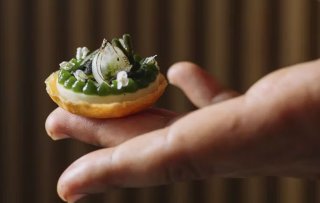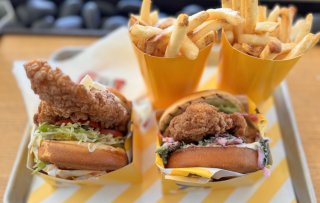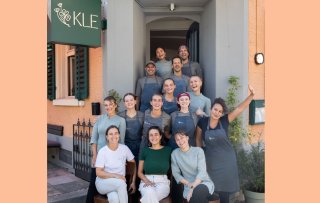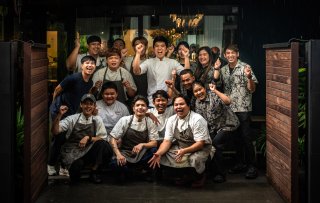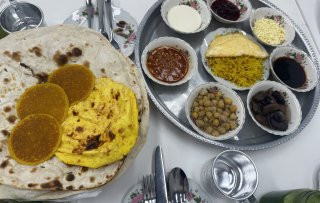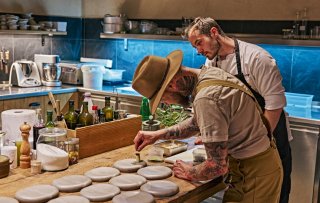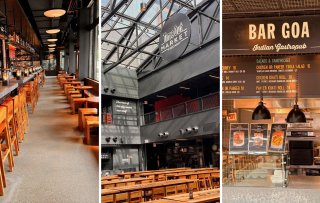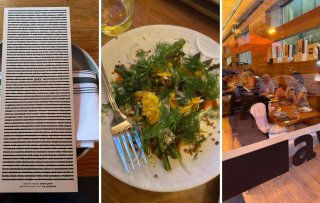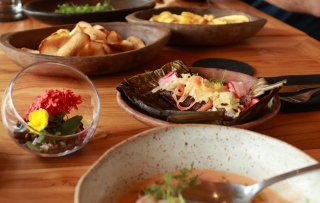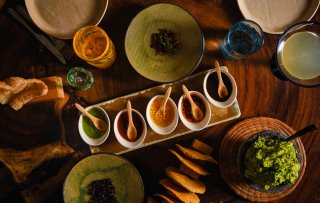Alice Waters is a living legend – a passionate advocate for healthy, seasonal, organic food and a transformative force in the culinary world. In her recent book, We Are What We Eat - A Slow Food Manifesto, Waters examines how fast food has deeply affected our food culture – and not in a positive way. She passionately advocates for embracing slow food values as an antidote to the fast food mindset. “We can change the world with what we eat. We’ve done it before,” she says in an interview with Food Inspiration.
Chez Panisse: a legacy of sustainability
Founded by Waters in 1971, restaurant Chez Panisse has pioneered the farm-to-table movement and remains a benchmark for sustainability. Celebrating 53 years, it was recently awarded a green Michelin star in recognition of its pioneering commitment to sustainable practices.
“Our operating principles have hardly changed over the past 53 years,” Waters explains. “We’ve never changed our criteria for buying produce: it has always been about local and organic foods. Over the years we’ve added the word ‘regenerative’ to our approach, as we’ve learned how crucial this is to combat climate change and foster local communities. Our restaurant is very mission-driven. People can’t leave without reading the word ‘organic.’ We’re not trying to press it on them, but we want them to know that we care.”
The restaurant serves a weekly-changing, fixed-price fine dining tasting menu based on the season’s bounty. Waters calls it “the perfect way to seduce people to taste something they’ve never had before.” Priced at $175 per person, the five-course menu showcases the best local produce. Additionally, the restaurant includes an upstairs café with a more accessible à la carte menu inspired by Mediterranean cuisine, changing daily to reflect seasonal availability.
“I opened Chez Panisse because feeding people good food felt like the only hopeful thing I could do.”
A vision rooted in activism
Waters’ vision for Chez Panisse was shaped by her activist roots. As a student at UC Berkeley in the 1960s, she participated in the Free Speech Movement and was influenced by the counterculture ethos of the era. At this time, Berkeley was a hotbed for progressive movements advocating for civil rights, protesting the Vietnam War, and challenging societal norms.
Her response to the industrialized, post-World War II American food culture was a restaurant that celebrated fresh, locally sourced ingredients and artisanal cooking methods – a radical contrast to the processed, uniform meals of fast food culture. Chez Panisse became her answer to fast food, embodying her philosophy of food as an experience of beauty, seasonality, and connection. The focus on sustainability and community has been a cornerstone of Chez Panisse’s success. From the start, the restaurant worked directly with farmers to source organic, seasonal produce while ensuring fair prices.
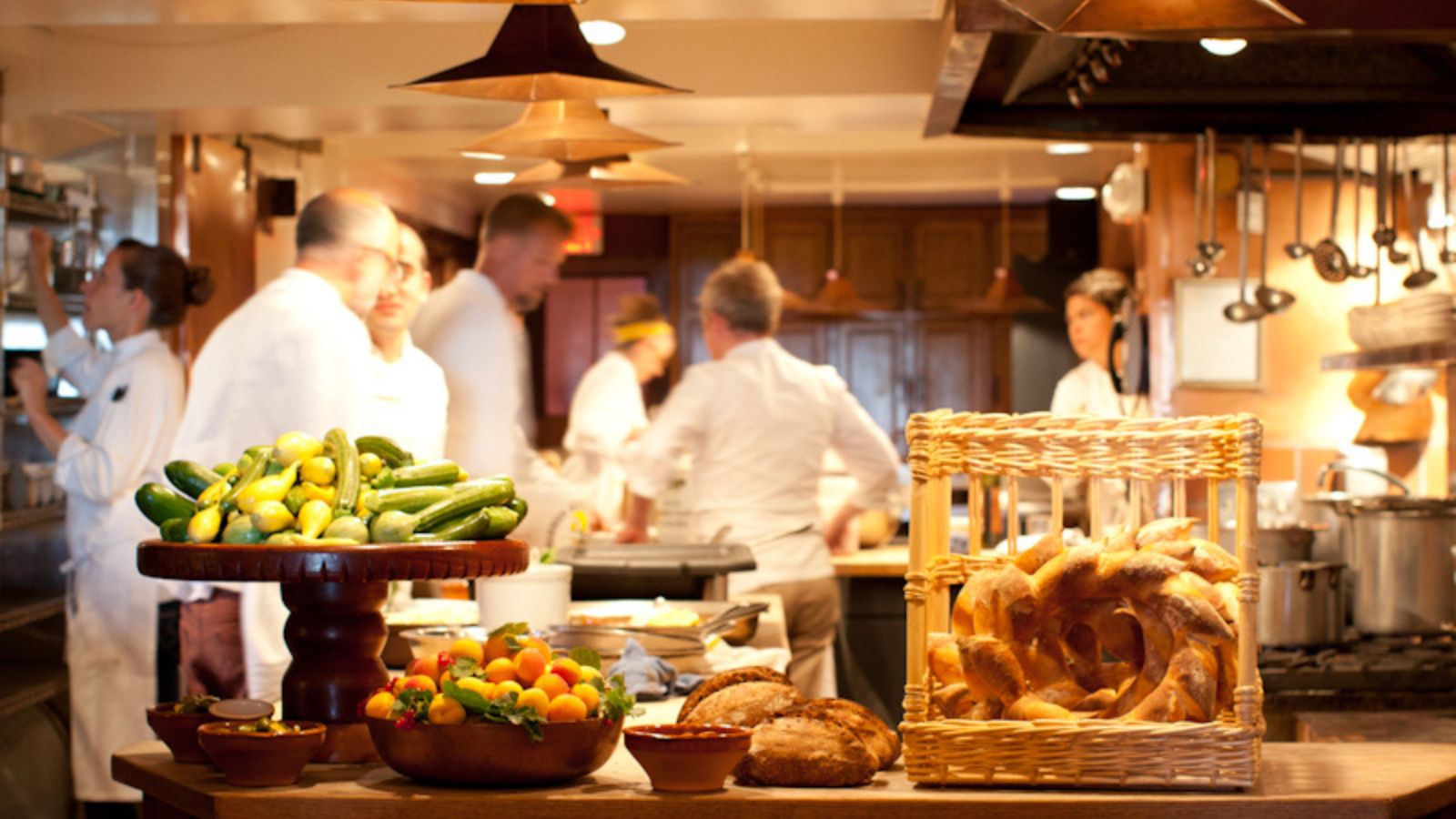
A family atmosphere
Chez Panisse has also cultivated a deep sense of family among its staff. “We’ve always hired people who are friends or friends of friends,” Waters shares. “We have an apprenticeship program, and people have come from around the world. Now, after so many years, we’re hiring the children of people who worked at the restaurant decades ago.” She fondly recounts how Jean-Pierre Moullé, one of Chez Panisse’s early chefs, now has a daughter working at the restaurant. “It proves to me that we are more than just a place to work – we’re a family working together to make something special happen every night.”
“The truth is, food should be affordable, but it can never be cheap.”
We Are What We Eat: A Slow Food Manifesto
In 2021, Waters published We Are What We Eat: A Slow Food Manifesto. The book reflects a philosophy she has championed for decades, one she found echoed in her meeting with fellow activist Carlo Petrini in 1988. At the time, Petrini was building Slow Food International, a grassroots political and educational organization dedicated to promoting sustainable and local food cultures. For Waters, the slow food vision aligned with everything she stands for and for years she was the vice president of Slow Food International.
While her ideas resonate deeply with many, some critics see them as romantic, nostalgic, or elitist. Waters acknowledges this perception but remains unwavering in her belief that to feed the world, society must move away from fast food culture and embrace slow food values. “We’ve mixed up the idea of affordability with cheapness,” she says. “When cheapness is the most important thing, no one talks about quality, or how good – or bad – a product might be for you or the planet. The truth is, food should be affordable, but it can never be cheap.”
Learning from the past
Waters believes today’s food challenges can be solved by revisiting past practices. “People need to realize that we’ve done this before, and we can do it again,” she asserts. “Before 1950, we knew how to grow our food in harmony with the basic principles of nature. But people find it hard to imagine how we’re going to feed 10 billion people with only local, organic food.”
The answer, Waters believes, is decentralization. During the pandemic, Waters turned her front yard into a victory garden, recalling the wartime practices of her childhood. “It connected me to my neighbors and reminded me of how we fed ourselves during World War II. “Mind you, there are far more people now, but I’m convinced that decentralization is the key.”
Advice for young chefs
Waters urges young chefs to embrace slow food values: “Always eat locally. Always eat organically. No question. It’s about health – for yourself, your guests, and the planet.” But for Waters, it’s also about building community. “I love going to farmers markets to meet people, ask questions, and share discoveries. Everyone needs that closeness to nature.”
|
Fast food values |
Slow food values |
|
Convenience |
Beauty |
|
Uniformity |
Biodiversity |
|
Availability |
Seasonality |
|
Trust in advertising |
Stewardship |
|
Cheapness |
Pleasure in work |
|
More is better |
Simplicity |
|
Speed |
Interconnectedness |
Fast food and slow food values according to Waters | Source: We Are What We Eat, a slowfood manifesto
Q&A with Alice Waters
We asked Alice Waters to expand on her vision by responding to six key statements from her book, We Are What We Eat: A Slow Food Manifesto. Here’s what she shared:
1. “Eating is a political act.”
"You vote with your fork,” Waters explains. “If you think about the dynamics behind the food you buy, you realize it can either support the people who are growing it and taking care of the land, or it can interfere with that. So yes, eating is very much about politics – It's about doing the right thing. And once I understood that it was not just the right thing to do but also the most delicious thing to do, everything changed."
She credits her early inspiration to her experiences in France during the 1960s. “At the time, people were still eating seasonally, locally, and organically – it was before pesticides and the mass importation of foods. Their perception of local and seasonal was so different to what I was used to. You couldn't even find olive oil in Paris. Only in the south of France. In Paris we ate butter. I remember the taste of the food so vividly, they were just so full of flavor, especially the berries. When I returned to the U.S., I longed for that same taste and cultural experience, like dining in a restaurant with a fixed-price menu marché. I wanted to be introduced to flavors that I otherwise wouldn’t have tried."
2. “Fast food is not just about the food itself – it’s about culture.”
Fast food emerged with the industrialization of our food system, Waters explains. “It has led to a tsunami of unhealthy foods that are highly processed, mass-produced, full of pesticides, herbicides and other unnatural and unnecessary additives.” Fast food values have replaced our traditional slow food values. In many ways they are opposites.” But fast food is not just about the food itself - it’s bigger than that: it’s about culture. For Waters this is a new realization from the past decade: “Culture affects the way we look at the world. It influences how we choose, what we buy and sell, how we do business. Culture is the invisible moral structure underneath us. Guiding us all subconsciously and shaping everything we do.”
When you're eating in a certain way every day, it becomes part of the way you think about the world. Our food values have changed at lightning speed. From the 60s onward, fast food restaurants started to convince a whole generation that we wanted food to be fast, cheap and easy. That more is better, and time is money. It made us long for uniformity: food should look and taste the same, no matter the season, wherever we are in the world. It made us want everything, everywhere, all at once. It is the reason why you can now live in the Netherlands and have avocados in November, and don’t realize that this is quite absurd.
Waters laments the loss of values from her childhood. “I want to sit with friends, enjoy beautiful, flavorful food, and feel connected to time and place. Right now, in Berkeley, it’s fall – we’re eating the last pears of the season and the first radicchio salads. That connection to nature and its rhythms is so important to me.”
3. “Seasonality is the foundation of good cooking.”
For Waters, seasonality is at the heart of her restaurant’s longevity. “No question about it. Chez Panisse has been busy for 53 years because people taste the difference when food is ripe and in season. You can’t pick an unripe avocado in Mexico, ship it across the world, and expect it to taste the same as one ripened on the tree and eaten nearby. That’s what we’ve always prioritized in our cooking. If you want to enjoy a product when it's at its best, it means you have to eat it nearby and right at its peak.”
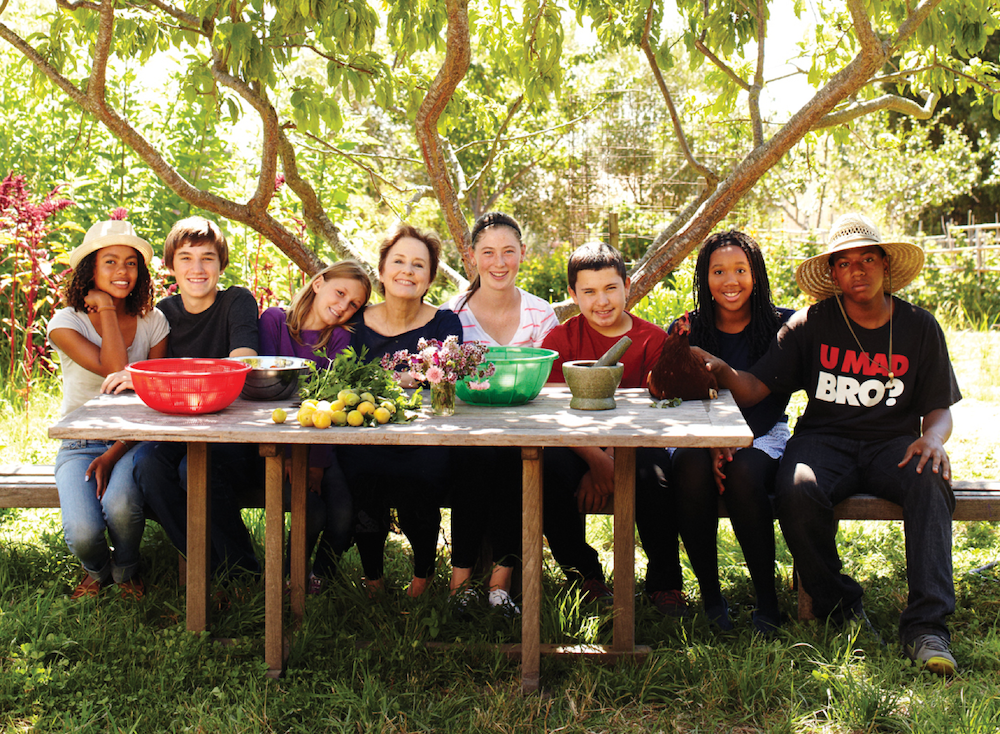
4. “Children should learn to grow, cook, and share food as part of their education.”
For Waters, food is a gateway to connection, knowledge, and transformation. “If it’s ripe, food has its own super power,” she says. “It’s almost like magic. That’s why I think the universal idea of school-supported agriculture could be amazing.”
Drawing from her Montessori background, Waters began the Edible Schoolyard project over 30 years ago. “As a Montessori teacher, I learned that our senses are the pathways into our minds – smelling, tasting, looking carefully, listening. Food encompasses all of that. The fact that we weren’t using food to open minds made the Edible Schoolyard an imperative.”
“I envisioned using the kitchen and garden as classrooms to teach academic subjects. In a geography class, for example, students might study the Middle East by making hummus and pita bread. When kids are engaged in this way – learning by doing – they remember, and they excel in their lessons.” Waters believes this hands-on approach can counteract the dominance of fast food culture, particularly for a generation that knows no other cultural reference. “If you teach children young, you get ahead of their addiction to fast food,” she asserts.
“If people grow it and cook it, they’ll eat it, no matter their age. Most people have been deprived of that experience, but when you give them something special – like a ripe pear or a warm loaf of whole-grain bread fresh out of the oven - it can be deeply emotional. It reconnects them with the beauty of food.” She hopes children will take away one thing from edible education: “They will be astonished by the taste of the food. I can’t think of more meaningful work than growing food for children.”
5. “Taste leads the way to sustainable eating.”
Chefs, Waters believes, play a crucial role in promoting sustainability. “Taste is the gateway. At Chez Panisse, we write the names of the farmers on our menus. People come in asking, ‘Do you have Masumoto’s peaches?’ And if we don’t, they want to know what’s available – maybe Bronx grapes or Bob’s radicchio. It’s about making it personal and connecting people to the farmers who make the food possible.
Transparency, she adds, is vital. “When I dine in another culture, I always want to know if the food is organic or if the animals are raised on regenerative grasslands. Those details aren’t just extra – they’re opportunities to educate and connect people with their food.”
Waters also advocates for collaboration among chefs. “We’re always ready to share resources and practices. Our kitchen is open to other chefs so they can see how the food is prepared. Chefs have a responsibility to teach – whether it’s by suggesting seasonal combinations on an à la carte menu or offering leftovers in a doggybag to educate guests about food waste. Our five-course tasting menus are designed to introduce people to flavors they might not have chosen on their own.”
6. “When we eat with intention, we become stewards, and by that, we become true environmentalists.”
Waters believes that intentional eating connects us deeply to the environment. “We become stewards of the land. When you’re on a farm or growing something in your backyard, you’re connecting with nature in the biggest way. Right now, when I look out my window, I see a redwood tree that’s over a hundred years old. It’s so beautiful, so strong, and so big – it never ceases to inspire me.”
“The same goes for watching a sunrise or sunset. It’s bigger than food. We are part of nature, although in the past decades, we’ve tried to separate ourselves from it in dramatic ways. But it’s inevitable that we return to the soil. To think of the Earth as our mother, knowing we’ve done so much to destroy her, is sobering. But we can change. We just need to use the magic of food to wake us up.”
Alice Waters: A Short Biography
Born: 1944, in Chatham, New Jersey, USA
Education: Studied French culture at the University of California, Berkeley, graduating in 1967.
Inspiration: A transformative year abroad in France introduced her to local markets, fresh ingredients, and the concept of seasonal cooking, deeply influencing her culinary philosophy.
Montessori Influence: Waters worked as a Montessori teacher early in her career, an experience that deeply shaped her work ethos, teaching philosophy, and her hands-on approach to cooking.
Chez Panisse: In 1971, Waters opened Chez Panisse in Berkeley, California, a pioneering restaurant centered on farm-to-table cuisine and sustainable, organic ingredients. It quickly gained international acclaim. It was named Best Restaurant in America by Gourmet magazine in 2001. It had a Michelinstar for a few years, and currently holds a green Michelinstar.
Slow food: In 1988 she got in contact with Carlo Petrini, who created a grassroots political and educational organization Slow Food International. She got involved in creating the Ark of Taste, a project that aims to collect and safeguard traditional foods from all cultures that are at risk of extinction. She has been vice president of the organization for many years.
Books: Authored numerous influential cookbooks, including Chez Panisse Cooking (1988) and The Art of Simple Food (2007), emphasizing seasonal, simple, and ingredient-driven recipes. In 2021 she published We Are What We Eat, A Slow Food Manifesto. In the beginning of 2025, her book about school supported agriculture will be published.
Legacy: Often referred to as the "mother of farm-to-table cuisine" in America, Waters’ philosophy and work continue to inspire a global movement toward sustainable and ethical food systems. Waters has mentored countless chefs and restaurateurs through the Chez Panisse kitchen.
Edible Schoolyard Project: In 1995, Waters founded the Edible Schoolyard Project, a program that integrates garden and kitchen education into school curriculums to promote healthy eating and environmental stewardship.
Accolades: Numerous James Beard Awards, including their Lifetime Achievement Award in 2004. In 1997, she became the first woman named "Best Chef in America." In 2021, she was named UNESCO Goodwill Ambassador for her advocacy in cultural and social change through gastronomy. In 2024, she was awarded the Julia Child award.
.jpg-28x28.jpg) Written by
Written by 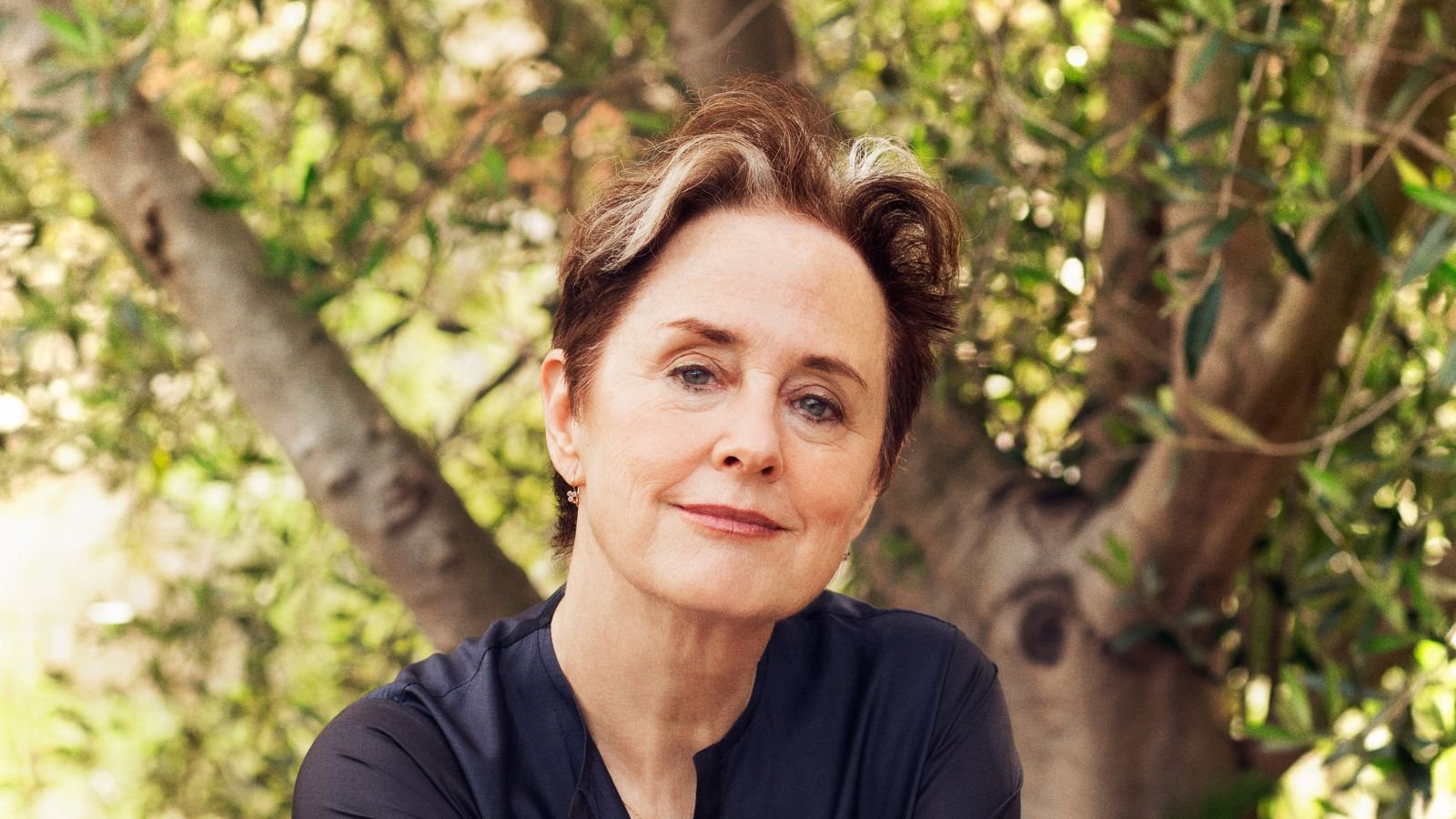
.jpg-300x300.jpg)
.jpg-50x50.jpg)












